初中英语外研版九下Module 7 English for you and me.Unit 1 Have you ever been to an English corner?作业(含解析)
文档属性
| 名称 | 初中英语外研版九下Module 7 English for you and me.Unit 1 Have you ever been to an English corner?作业(含解析) |
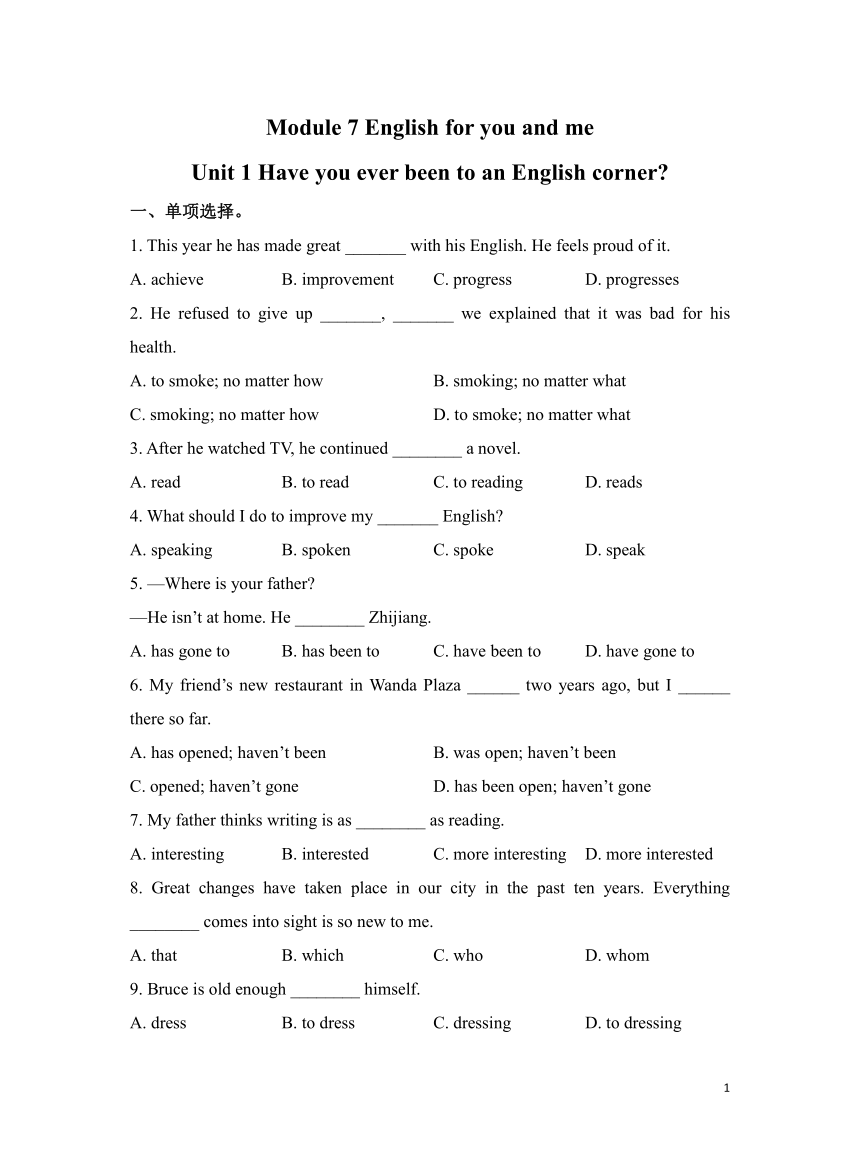
|
|
| 格式 | docx | ||
| 文件大小 | 26.4KB | ||
| 资源类型 | 教案 | ||
| 版本资源 | 外研版 | ||
| 科目 | 英语 | ||
| 更新时间 | 2023-08-30 16:21:00 | ||
图片预览

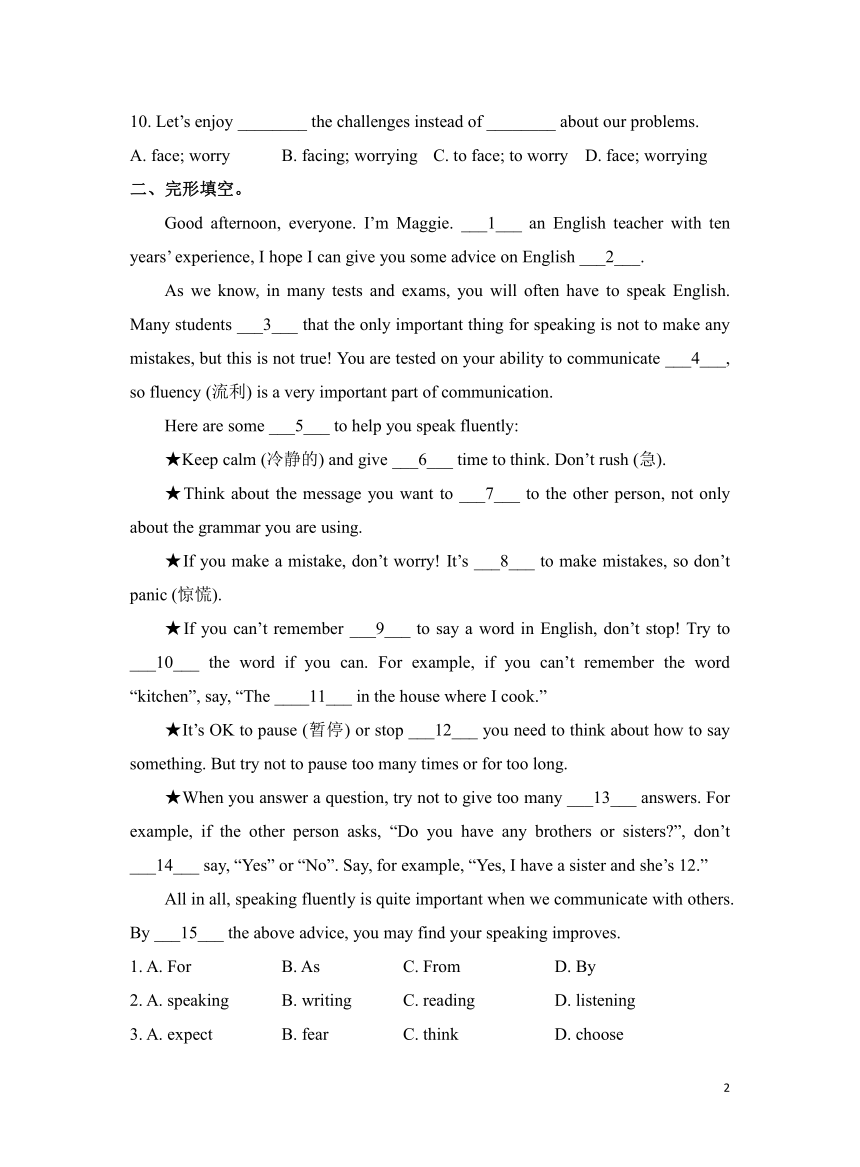
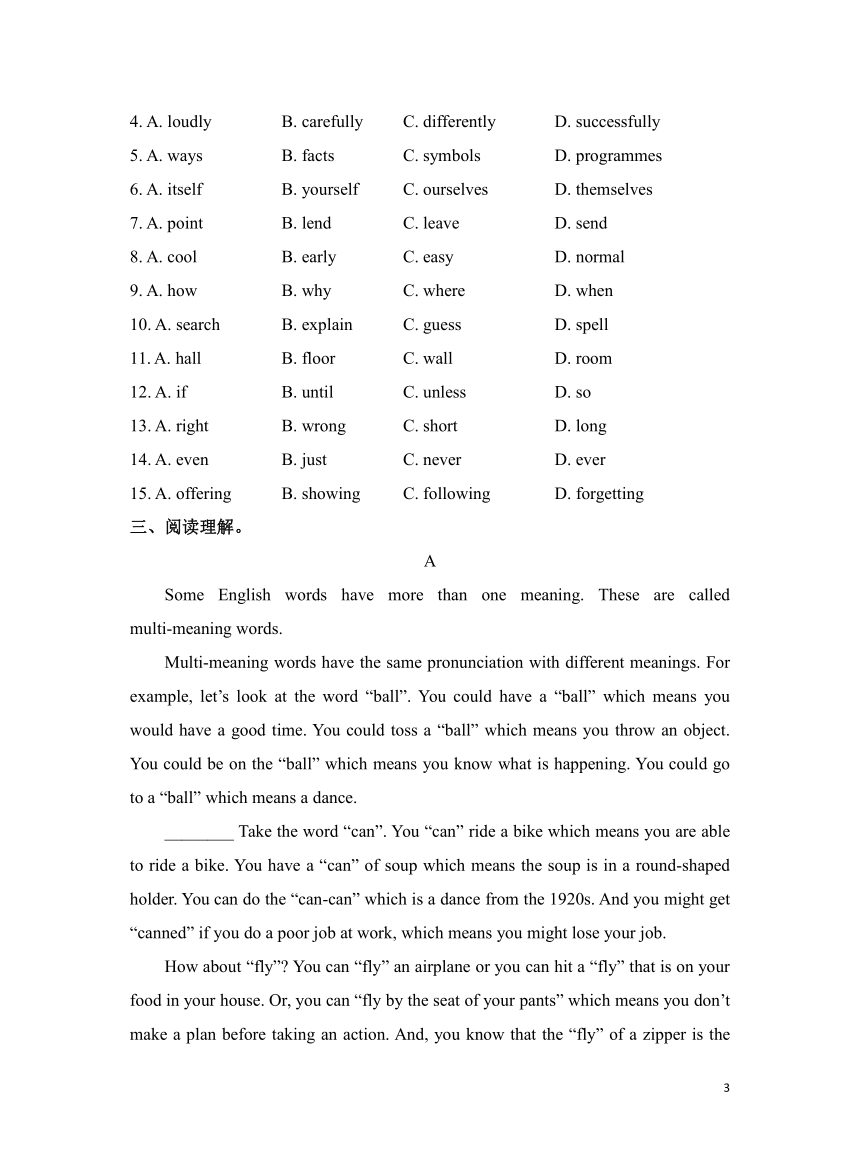
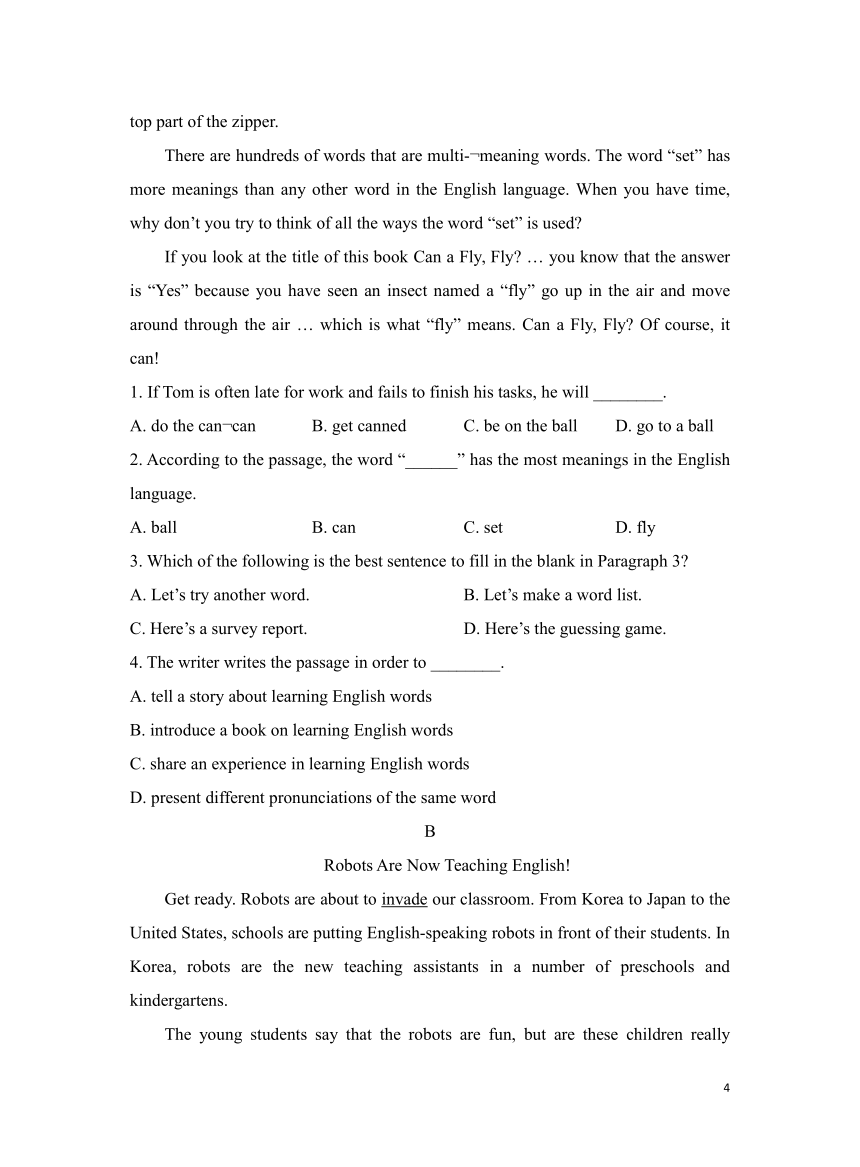
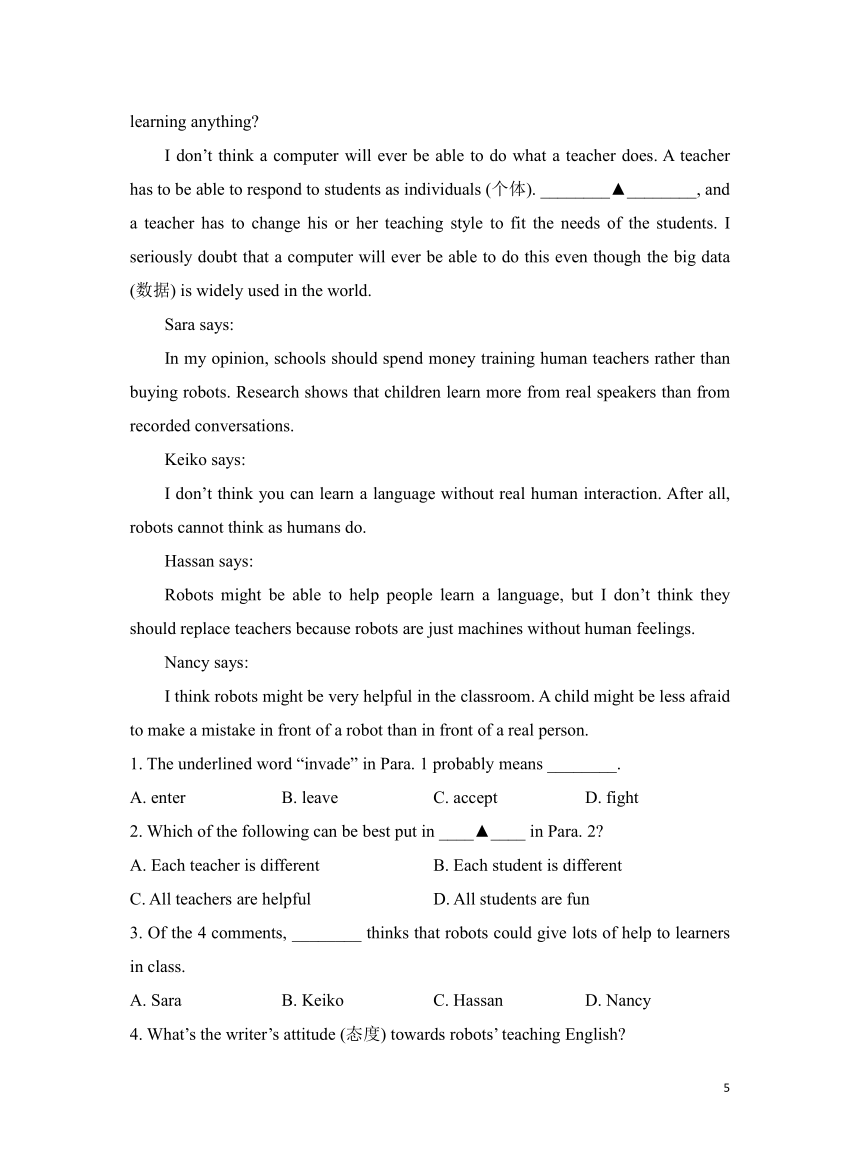
文档简介
Module 7 English for you and me
Unit 1 Have you ever been to an English corner
一、单项选择。
1. This year he has made great _______ with his English. He feels proud of it.
A. achieve B. improvement C. progress D. progresses
2. He refused to give up _______, _______ we explained that it was bad for his health.
A. to smoke; no matter how B. smoking; no matter what
C. smoking; no matter how D. to smoke; no matter what
3. After he watched TV, he continued ________ a novel.
A. read B. to read C. to reading D. reads
4. What should I do to improve my _______ English
A. speaking B. spoken C. spoke D. speak
5. —Where is your father
—He isn’t at home. He ________ Zhijiang.
A. has gone to B. has been to C. have been to D. have gone to
6. My friend’s new restaurant in Wanda Plaza ______ two years ago, but I ______ there so far.
A. has opened; haven’t been B. was open; haven’t been
C. opened; haven’t gone D. has been open; haven’t gone
7. My father thinks writing is as ________ as reading.
A. interesting B. interested C. more interesting D. more interested
8. Great changes have taken place in our city in the past ten years. Everything ________ comes into sight is so new to me.
A. that B. which C. who D. whom
9. Bruce is old enough ________ himself.
A. dress B. to dress C. dressing D. to dressing
10. Let’s enjoy ________ the challenges instead of ________ about our problems.
A. face; worry B. facing; worrying C. to face; to worry D. face; worrying
二、完形填空。
Good afternoon, everyone. I’m Maggie. ___1___ an English teacher with ten years’ experience, I hope I can give you some advice on English ___2___.
As we know, in many tests and exams, you will often have to speak English. Many students ___3___ that the only important thing for speaking is not to make any mistakes, but this is not true! You are tested on your ability to communicate ___4___, so fluency (流利) is a very important part of communication.
Here are some ___5___ to help you speak fluently:
★Keep calm (冷静的) and give ___6___ time to think. Don’t rush (急).
★Think about the message you want to ___7___ to the other person, not only about the grammar you are using.
★If you make a mistake, don’t worry! It’s ___8___ to make mistakes, so don’t panic (惊慌).
★If you can’t remember ___9___ to say a word in English, don’t stop! Try to ___10___ the word if you can. For example, if you can’t remember the word “kitchen”, say, “The ____11___ in the house where I cook.”
★It’s OK to pause (暂停) or stop ___12___ you need to think about how to say something. But try not to pause too many times or for too long.
★When you answer a question, try not to give too many ___13___ answers. For example, if the other person asks, “Do you have any brothers or sisters ”, don’t ___14___ say, “Yes” or “No”. Say, for example, “Yes, I have a sister and she’s 12.”
All in all, speaking fluently is quite important when we communicate with others. By ___15___ the above advice, you may find your speaking improves.
1. A. For B. As C. From D. By
2. A. speaking B. writing C. reading D. listening
3. A. expect B. fear C. think D. choose
4. A. loudly B. carefully C. differently D. successfully
5. A. ways B. facts C. symbols D. programmes
6. A. itself B. yourself C. ourselves D. themselves
7. A. point B. lend C. leave D. send
8. A. cool B. early C. easy D. normal
9. A. how B. why C. where D. when
10. A. search B. explain C. guess D. spell
11. A. hall B. floor C. wall D. room
12. A. if B. until C. unless D. so
13. A. right B. wrong C. short D. long
14. A. even B. just C. never D. ever
15. A. offering B. showing C. following D. forgetting
三、阅读理解。
A
Some English words have more than one meaning. These are called multi-meaning words.
Multi-meaning words have the same pronunciation with different meanings. For example, let’s look at the word “ball”. You could have a “ball” which means you would have a good time. You could toss a “ball” which means you throw an object. You could be on the “ball” which means you know what is happening. You could go to a “ball” which means a dance.
________ Take the word “can”. You “can” ride a bike which means you are able to ride a bike. You have a “can” of soup which means the soup is in a round-shaped holder. You can do the “can-can” which is a dance from the 1920s. And you might get “canned” if you do a poor job at work, which means you might lose your job.
How about “fly” You can “fly” an airplane or you can hit a “fly” that is on your food in your house. Or, you can “fly by the seat of your pants” which means you don’t make a plan before taking an action. And, you know that the “fly” of a zipper is the top part of the zipper.
There are hundreds of words that are multi- meaning words. The word “set” has more meanings than any other word in the English language. When you have time, why don’t you try to think of all the ways the word “set” is used
If you look at the title of this book Can a Fly, Fly … you know that the answer is “Yes” because you have seen an insect named a “fly” go up in the air and move around through the air … which is what “fly” means. Can a Fly, Fly Of course, it can!
1. If Tom is often late for work and fails to finish his tasks, he will ________.
A. do the can can B. get canned C. be on the ball D. go to a ball
2. According to the passage, the word “______” has the most meanings in the English language.
A. ball B. can C. set D. fly
3. Which of the following is the best sentence to fill in the blank in Paragraph 3
A. Let’s try another word. B. Let’s make a word list.
C. Here’s a survey report. D. Here’s the guessing game.
4. The writer writes the passage in order to ________.
A. tell a story about learning English words
B. introduce a book on learning English words
C. share an experience in learning English words
D. present different pronunciations of the same word
B
Robots Are Now Teaching English!
Get ready. Robots are about to invade our classroom. From Korea to Japan to the United States, schools are putting English-speaking robots in front of their students. In Korea, robots are the new teaching assistants in a number of preschools and kindergartens.
The young students say that the robots are fun, but are these children really learning anything
I don’t think a computer will ever be able to do what a teacher does. A teacher has to be able to respond to students as individuals (个体). ________▲________, and a teacher has to change his or her teaching style to fit the needs of the students. I seriously doubt that a computer will ever be able to do this even though the big data (数据) is widely used in the world.
Sara says:
In my opinion, schools should spend money training human teachers rather than buying robots. Research shows that children learn more from real speakers than from recorded conversations.
Keiko says:
I don’t think you can learn a language without real human interaction. After all, robots cannot think as humans do.
Hassan says:
Robots might be able to help people learn a language, but I don’t think they should replace teachers because robots are just machines without human feelings.
Nancy says:
I think robots might be very helpful in the classroom. A child might be less afraid to make a mistake in front of a robot than in front of a real person.
1. The underlined word “invade” in Para. 1 probably means ________.
A. enter B. leave C. accept D. fight
2. Which of the following can be best put in ____▲____ in Para. 2
A. Each teacher is different B. Each student is different
C. All teachers are helpful D. All students are fun
3. Of the 4 comments, ________ thinks that robots could give lots of help to learners in class.
A. Sara B. Keiko C. Hassan D. Nancy
4. What’s the writer’s attitude (态度) towards robots’ teaching English
A. Uncaring. B. Supportive. C. Doubtful. D. Agreeable.
参考答案与解析
一、
1. C
【解析】make progress with …意为“在……方面取得进展”。progress是不可数名词,没有复数形式,答案为C。
2. C
【解析】give up doing sth.意为“放弃做某事”,排除A、D项;根据后半句的意思“无论我们怎样解释那对他的健康是有害的”。“no matter how”意为“无论怎样”。
3. B
【解析】continue to do sth.意为“继续做某事”,符合语境。
4. B
【解析】“口语”用spoken English。
5. A
【解析】has gone to已经去了, has/have been to曾经去过。从答语第一句可知他不在此处, 故用“已经去了”。故选A。
6. B
【解析】由two years ago可知前半句为一般过去时,故排除A和D;又因后半句中so far表示“迄今为止”,可知后半句应用现在完成时。have gone to表示“去了某地”,还没有回来;have been to表示“去过某地”,人已经回来了。故选B。
7. A
【解析】interesting有趣的;interested感兴趣的;more interesting更加有趣的;more interested更加感兴趣的。as ... as意为“和……一样”,中间跟形容词或副词原形。故选A。
8. A
【解析】先行词是不定代词everything时,关系代词只能用that。故选A。
9. B
【解析】be +形容词+enough to do sth.足够……做某事。
10. B
【解析】enjoy doing sth.“喜欢做某事”;instead of后跟动词的 ing形式,故选B。
二、【解析】本文主要介绍了作为一名有十年经验的英语老师——玛吉,给大家分享一些学习英语口语方面有用的建议。
1. B句意:作为一名有十年经验的英语教师。
for为,给;as作为;from来自;by通过。根据句意可知,空格所在句说的是“作为一名老师”,故选B。
2. A句意:我希望我能在英语方面给你一些有用的建议。
speaking说;writing写;reading读;listening听。下文的句子“As we know, in many tests and exams, you often have to speak English.”谈到了说英语。故选A。
3. C句意:许多学生认为说英语最重要的事情是少犯错误。
expect期望;fear怕;think认为;choose选择。根据下文的句子“but this is not true!”可知,空格所在句表达的是“学生的看法”,故选C。
4. D句意:测试你成功沟通的能力。
loudly大声地;carefully仔细地;differently不同地;successfully成功地。通过空格后的句子“so fluency (流利) is a very important part of communication.”强调了流利是沟通中非常重要的一部分。可推测,本句说的是“成功沟通的能力”,故选D。
5. A句意:这里有一些能帮助你流利说英语的一些方法。
ways方法;facts事实;symbols象征;programs程序,节目。下文提供了几种能帮助流利说英语的方法,故选A。
6. B句意:保持冷静,给自己时间思考。
itself 它自己;yourself你自己;ourselves我们自己;themselves他们自己。根据“Here are ... to help you speak fluently.”可知,“you”对应的反身代词是yourself,故选 B。
7. D句意:想想你想传达给对方的信息,而不仅仅是你所使用的语法。
write写;lend借;invite邀请;send发送,传递。根据句意可知,这里说的是考虑一下你想传达给别人的信息。故选D。
8. D句意:犯错误很正常。
cool冷静的;early早的;easy容易的;normal正常的。根据空格前的句 If you make a mistake, don’t worry可推测,这里说的是“犯错误很正常”,故选D。
9. A句意:如果你不记得怎么用英语说一个词,不要停下来!
how如何;why为什么;where在哪里;when什么时候。根据句意可知,这里应该是不记得如何用英语表达一个词,故选A。
10. B句意:如果你记得的话,试着解释这个词。
search搜索;explain解释;guess猜;spell用字母拼写。根据下文的举例可知,当不记得单词的时候,要试着解释它。故选B。
11. D句意:我做饭的房间。
hall大厅;floor地板;wall墙;room房间。这里是对kitchen的解释,可知,厨房应该解释为是一个做饭的房间。故选D。
12. A句意:如果你需要考虑如何说什么,可以暂停或停止。
if 如果;until直到;unless除非;so因此。根据空格前后句可构成假设关系。故选A。
13. C句意:当你回答一个问题时,尽量不要给出太多简短的答案。
right正确的;wrong错误的;short简短的;long长的。根据下文举例可知,说的是“不要给出太多简短的回答”,故选C。
14. B句意:不要只说“是”或“不”。
even直至;just仅仅;never从不;ever曾经。根据下文举例的答语Say, for example, “Yes, I have a sister and she is 12.”可知,建议不要只说“是” 或“不”,而是要多说一些信息。故选B。
15. C句意:按照上面的建议,你可能发现你的口语进步很快。
offering提供;showing展示;following跟随;forgetting忘记。最后一段是总结的话可知,这里说的是“按照以上的建议做,你可能发现口语进步很快”, 故选C。
三、A篇【解析】本文是一篇说明文,作者通过单词“ball”和“can”为例谈论多义词的问题。
1. B 细节理解题 根据And you might get “canned” if you do a poor job at work, which means you might lose your job.可知在工作中表现不好,就会失去工作,也即get canned。故选B。
2. C 细节理解题 根据the word “set” has more meanings than any other word 在这里的意思就是the word “set” has the most meanings,可知这个词是set,故选 C。
3. A 推理判断题 文章第二、三段都在介绍单词的多种意思,上一段介绍了“ball”的意思,下一段介绍了“can”, 故中间缺一衔接句,A项符合,故选A。
4. B 主旨大意题 根据If you look at the title of this book Can a Fly, Fly …可以看岀文章介绍的是一本关于学习英语词汇的书,ACD三项的内容都没有提及,故选B。
B篇【解析】文章大意:机器人即将进入我们的教室。从韩国到日本再到美国, 学校都在把会说英语的机器人放在学生面前。在韩国, 机器人成为许多幼儿园的新助教。针对这种现象, 作者和其他四个人发表了自己的评论。
1. A 词义猜测题。根据下文“From Korea to Japan to the United States, schools are putting English-speaking robots in front of their students. In Korea, robots are the new teaching assistants in a number of preschools and kindergartens.”可知, 此处说的是机器人即将进入我们的教室。所以invade应该是“进入”的意思, 故选A。
2. B 词句猜测题。根据上文“A teacher has to be able to respond to students as individuals.”以及下文“and a teacher has to change his or her teaching style to fit the needs of the students.”可知此处表达的应是“每个学生都不一样”, 所以教师应该根据学生的需要改变教学方式, 故选B。
3. D 细节理解题。根据“Nancy says: I think robots might be very helpful in the classroom.”可知, 在这4条评论中, Nancy认为机器人可以在课堂上给学习者很多帮助, 故选D。
4. C细节理解题。根据I seriously doubt that a computer will ever be able to do this even though the big data is widely used in the world.尽管大数据在世界上得到了广泛的应用,但我常怀疑计算机是否有能力做到这一点。可知,作者对机器人教英语是持有怀疑的态度的,故答案选C。
1
Unit 1 Have you ever been to an English corner
一、单项选择。
1. This year he has made great _______ with his English. He feels proud of it.
A. achieve B. improvement C. progress D. progresses
2. He refused to give up _______, _______ we explained that it was bad for his health.
A. to smoke; no matter how B. smoking; no matter what
C. smoking; no matter how D. to smoke; no matter what
3. After he watched TV, he continued ________ a novel.
A. read B. to read C. to reading D. reads
4. What should I do to improve my _______ English
A. speaking B. spoken C. spoke D. speak
5. —Where is your father
—He isn’t at home. He ________ Zhijiang.
A. has gone to B. has been to C. have been to D. have gone to
6. My friend’s new restaurant in Wanda Plaza ______ two years ago, but I ______ there so far.
A. has opened; haven’t been B. was open; haven’t been
C. opened; haven’t gone D. has been open; haven’t gone
7. My father thinks writing is as ________ as reading.
A. interesting B. interested C. more interesting D. more interested
8. Great changes have taken place in our city in the past ten years. Everything ________ comes into sight is so new to me.
A. that B. which C. who D. whom
9. Bruce is old enough ________ himself.
A. dress B. to dress C. dressing D. to dressing
10. Let’s enjoy ________ the challenges instead of ________ about our problems.
A. face; worry B. facing; worrying C. to face; to worry D. face; worrying
二、完形填空。
Good afternoon, everyone. I’m Maggie. ___1___ an English teacher with ten years’ experience, I hope I can give you some advice on English ___2___.
As we know, in many tests and exams, you will often have to speak English. Many students ___3___ that the only important thing for speaking is not to make any mistakes, but this is not true! You are tested on your ability to communicate ___4___, so fluency (流利) is a very important part of communication.
Here are some ___5___ to help you speak fluently:
★Keep calm (冷静的) and give ___6___ time to think. Don’t rush (急).
★Think about the message you want to ___7___ to the other person, not only about the grammar you are using.
★If you make a mistake, don’t worry! It’s ___8___ to make mistakes, so don’t panic (惊慌).
★If you can’t remember ___9___ to say a word in English, don’t stop! Try to ___10___ the word if you can. For example, if you can’t remember the word “kitchen”, say, “The ____11___ in the house where I cook.”
★It’s OK to pause (暂停) or stop ___12___ you need to think about how to say something. But try not to pause too many times or for too long.
★When you answer a question, try not to give too many ___13___ answers. For example, if the other person asks, “Do you have any brothers or sisters ”, don’t ___14___ say, “Yes” or “No”. Say, for example, “Yes, I have a sister and she’s 12.”
All in all, speaking fluently is quite important when we communicate with others. By ___15___ the above advice, you may find your speaking improves.
1. A. For B. As C. From D. By
2. A. speaking B. writing C. reading D. listening
3. A. expect B. fear C. think D. choose
4. A. loudly B. carefully C. differently D. successfully
5. A. ways B. facts C. symbols D. programmes
6. A. itself B. yourself C. ourselves D. themselves
7. A. point B. lend C. leave D. send
8. A. cool B. early C. easy D. normal
9. A. how B. why C. where D. when
10. A. search B. explain C. guess D. spell
11. A. hall B. floor C. wall D. room
12. A. if B. until C. unless D. so
13. A. right B. wrong C. short D. long
14. A. even B. just C. never D. ever
15. A. offering B. showing C. following D. forgetting
三、阅读理解。
A
Some English words have more than one meaning. These are called multi-meaning words.
Multi-meaning words have the same pronunciation with different meanings. For example, let’s look at the word “ball”. You could have a “ball” which means you would have a good time. You could toss a “ball” which means you throw an object. You could be on the “ball” which means you know what is happening. You could go to a “ball” which means a dance.
________ Take the word “can”. You “can” ride a bike which means you are able to ride a bike. You have a “can” of soup which means the soup is in a round-shaped holder. You can do the “can-can” which is a dance from the 1920s. And you might get “canned” if you do a poor job at work, which means you might lose your job.
How about “fly” You can “fly” an airplane or you can hit a “fly” that is on your food in your house. Or, you can “fly by the seat of your pants” which means you don’t make a plan before taking an action. And, you know that the “fly” of a zipper is the top part of the zipper.
There are hundreds of words that are multi- meaning words. The word “set” has more meanings than any other word in the English language. When you have time, why don’t you try to think of all the ways the word “set” is used
If you look at the title of this book Can a Fly, Fly … you know that the answer is “Yes” because you have seen an insect named a “fly” go up in the air and move around through the air … which is what “fly” means. Can a Fly, Fly Of course, it can!
1. If Tom is often late for work and fails to finish his tasks, he will ________.
A. do the can can B. get canned C. be on the ball D. go to a ball
2. According to the passage, the word “______” has the most meanings in the English language.
A. ball B. can C. set D. fly
3. Which of the following is the best sentence to fill in the blank in Paragraph 3
A. Let’s try another word. B. Let’s make a word list.
C. Here’s a survey report. D. Here’s the guessing game.
4. The writer writes the passage in order to ________.
A. tell a story about learning English words
B. introduce a book on learning English words
C. share an experience in learning English words
D. present different pronunciations of the same word
B
Robots Are Now Teaching English!
Get ready. Robots are about to invade our classroom. From Korea to Japan to the United States, schools are putting English-speaking robots in front of their students. In Korea, robots are the new teaching assistants in a number of preschools and kindergartens.
The young students say that the robots are fun, but are these children really learning anything
I don’t think a computer will ever be able to do what a teacher does. A teacher has to be able to respond to students as individuals (个体). ________▲________, and a teacher has to change his or her teaching style to fit the needs of the students. I seriously doubt that a computer will ever be able to do this even though the big data (数据) is widely used in the world.
Sara says:
In my opinion, schools should spend money training human teachers rather than buying robots. Research shows that children learn more from real speakers than from recorded conversations.
Keiko says:
I don’t think you can learn a language without real human interaction. After all, robots cannot think as humans do.
Hassan says:
Robots might be able to help people learn a language, but I don’t think they should replace teachers because robots are just machines without human feelings.
Nancy says:
I think robots might be very helpful in the classroom. A child might be less afraid to make a mistake in front of a robot than in front of a real person.
1. The underlined word “invade” in Para. 1 probably means ________.
A. enter B. leave C. accept D. fight
2. Which of the following can be best put in ____▲____ in Para. 2
A. Each teacher is different B. Each student is different
C. All teachers are helpful D. All students are fun
3. Of the 4 comments, ________ thinks that robots could give lots of help to learners in class.
A. Sara B. Keiko C. Hassan D. Nancy
4. What’s the writer’s attitude (态度) towards robots’ teaching English
A. Uncaring. B. Supportive. C. Doubtful. D. Agreeable.
参考答案与解析
一、
1. C
【解析】make progress with …意为“在……方面取得进展”。progress是不可数名词,没有复数形式,答案为C。
2. C
【解析】give up doing sth.意为“放弃做某事”,排除A、D项;根据后半句的意思“无论我们怎样解释那对他的健康是有害的”。“no matter how”意为“无论怎样”。
3. B
【解析】continue to do sth.意为“继续做某事”,符合语境。
4. B
【解析】“口语”用spoken English。
5. A
【解析】has gone to已经去了, has/have been to曾经去过。从答语第一句可知他不在此处, 故用“已经去了”。故选A。
6. B
【解析】由two years ago可知前半句为一般过去时,故排除A和D;又因后半句中so far表示“迄今为止”,可知后半句应用现在完成时。have gone to表示“去了某地”,还没有回来;have been to表示“去过某地”,人已经回来了。故选B。
7. A
【解析】interesting有趣的;interested感兴趣的;more interesting更加有趣的;more interested更加感兴趣的。as ... as意为“和……一样”,中间跟形容词或副词原形。故选A。
8. A
【解析】先行词是不定代词everything时,关系代词只能用that。故选A。
9. B
【解析】be +形容词+enough to do sth.足够……做某事。
10. B
【解析】enjoy doing sth.“喜欢做某事”;instead of后跟动词的 ing形式,故选B。
二、【解析】本文主要介绍了作为一名有十年经验的英语老师——玛吉,给大家分享一些学习英语口语方面有用的建议。
1. B句意:作为一名有十年经验的英语教师。
for为,给;as作为;from来自;by通过。根据句意可知,空格所在句说的是“作为一名老师”,故选B。
2. A句意:我希望我能在英语方面给你一些有用的建议。
speaking说;writing写;reading读;listening听。下文的句子“As we know, in many tests and exams, you often have to speak English.”谈到了说英语。故选A。
3. C句意:许多学生认为说英语最重要的事情是少犯错误。
expect期望;fear怕;think认为;choose选择。根据下文的句子“but this is not true!”可知,空格所在句表达的是“学生的看法”,故选C。
4. D句意:测试你成功沟通的能力。
loudly大声地;carefully仔细地;differently不同地;successfully成功地。通过空格后的句子“so fluency (流利) is a very important part of communication.”强调了流利是沟通中非常重要的一部分。可推测,本句说的是“成功沟通的能力”,故选D。
5. A句意:这里有一些能帮助你流利说英语的一些方法。
ways方法;facts事实;symbols象征;programs程序,节目。下文提供了几种能帮助流利说英语的方法,故选A。
6. B句意:保持冷静,给自己时间思考。
itself 它自己;yourself你自己;ourselves我们自己;themselves他们自己。根据“Here are ... to help you speak fluently.”可知,“you”对应的反身代词是yourself,故选 B。
7. D句意:想想你想传达给对方的信息,而不仅仅是你所使用的语法。
write写;lend借;invite邀请;send发送,传递。根据句意可知,这里说的是考虑一下你想传达给别人的信息。故选D。
8. D句意:犯错误很正常。
cool冷静的;early早的;easy容易的;normal正常的。根据空格前的句 If you make a mistake, don’t worry可推测,这里说的是“犯错误很正常”,故选D。
9. A句意:如果你不记得怎么用英语说一个词,不要停下来!
how如何;why为什么;where在哪里;when什么时候。根据句意可知,这里应该是不记得如何用英语表达一个词,故选A。
10. B句意:如果你记得的话,试着解释这个词。
search搜索;explain解释;guess猜;spell用字母拼写。根据下文的举例可知,当不记得单词的时候,要试着解释它。故选B。
11. D句意:我做饭的房间。
hall大厅;floor地板;wall墙;room房间。这里是对kitchen的解释,可知,厨房应该解释为是一个做饭的房间。故选D。
12. A句意:如果你需要考虑如何说什么,可以暂停或停止。
if 如果;until直到;unless除非;so因此。根据空格前后句可构成假设关系。故选A。
13. C句意:当你回答一个问题时,尽量不要给出太多简短的答案。
right正确的;wrong错误的;short简短的;long长的。根据下文举例可知,说的是“不要给出太多简短的回答”,故选C。
14. B句意:不要只说“是”或“不”。
even直至;just仅仅;never从不;ever曾经。根据下文举例的答语Say, for example, “Yes, I have a sister and she is 12.”可知,建议不要只说“是” 或“不”,而是要多说一些信息。故选B。
15. C句意:按照上面的建议,你可能发现你的口语进步很快。
offering提供;showing展示;following跟随;forgetting忘记。最后一段是总结的话可知,这里说的是“按照以上的建议做,你可能发现口语进步很快”, 故选C。
三、A篇【解析】本文是一篇说明文,作者通过单词“ball”和“can”为例谈论多义词的问题。
1. B 细节理解题 根据And you might get “canned” if you do a poor job at work, which means you might lose your job.可知在工作中表现不好,就会失去工作,也即get canned。故选B。
2. C 细节理解题 根据the word “set” has more meanings than any other word 在这里的意思就是the word “set” has the most meanings,可知这个词是set,故选 C。
3. A 推理判断题 文章第二、三段都在介绍单词的多种意思,上一段介绍了“ball”的意思,下一段介绍了“can”, 故中间缺一衔接句,A项符合,故选A。
4. B 主旨大意题 根据If you look at the title of this book Can a Fly, Fly …可以看岀文章介绍的是一本关于学习英语词汇的书,ACD三项的内容都没有提及,故选B。
B篇【解析】文章大意:机器人即将进入我们的教室。从韩国到日本再到美国, 学校都在把会说英语的机器人放在学生面前。在韩国, 机器人成为许多幼儿园的新助教。针对这种现象, 作者和其他四个人发表了自己的评论。
1. A 词义猜测题。根据下文“From Korea to Japan to the United States, schools are putting English-speaking robots in front of their students. In Korea, robots are the new teaching assistants in a number of preschools and kindergartens.”可知, 此处说的是机器人即将进入我们的教室。所以invade应该是“进入”的意思, 故选A。
2. B 词句猜测题。根据上文“A teacher has to be able to respond to students as individuals.”以及下文“and a teacher has to change his or her teaching style to fit the needs of the students.”可知此处表达的应是“每个学生都不一样”, 所以教师应该根据学生的需要改变教学方式, 故选B。
3. D 细节理解题。根据“Nancy says: I think robots might be very helpful in the classroom.”可知, 在这4条评论中, Nancy认为机器人可以在课堂上给学习者很多帮助, 故选D。
4. C细节理解题。根据I seriously doubt that a computer will ever be able to do this even though the big data is widely used in the world.尽管大数据在世界上得到了广泛的应用,但我常怀疑计算机是否有能力做到这一点。可知,作者对机器人教英语是持有怀疑的态度的,故答案选C。
1
同课章节目录
- Module 1 Travel
- Unit 1 We toured the city by bus and by taxi
- Unit 2 It's a long story.
- Unit 3 Language in use
- Module 2 Education
- Unit 1 They don't sit in rows.
- Unit 2 What do I like best about school?
- Unit 3 Language in use
- Module 3 Life now and then
- Unit 1 They sometimes work harder.
- Unit 2 I think life is better today.
- Unit 3 Language in use.
- Module 4 Rules and suggestions
- Unit 1 You must be careful of falling stones.
- Unit 2 we must keep the camp clean.
- Unit 3 Language in use.
- Revison A
- Module 5 Look after yourself
- Unit 1 We'd better get you to hospital.
- Unit 2 Get off the sofa!
- Unit 3 Language in use.
- Module 6 Eating togethe
- Unit 1 When is the school-leavers' party?
- Unit 2 Knives and forks are used for most Western
- Unit 3 Language in use
- Module 7 English for you and me
- Unit 1 Have you ever been to an English corner?
- Unit 2 We all own English.
- Unit 3 Language in use
- Module 8 My future life
- Unit 1 Here's to our friendship and the future
- Unit 2 I know that you will be better at maths.
- Unit 3 Language in use
- Revison B
